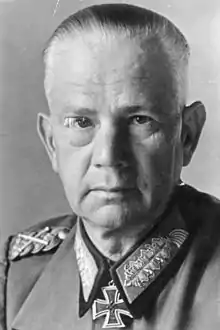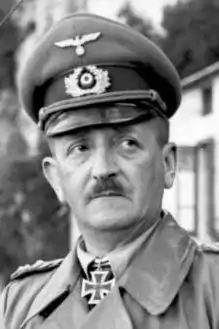10th Army (Wehrmacht)
The 10th Army (German: 10. Armee) was a World War II field army of the Wehrmacht (Germany).
| 10th Army | |
|---|---|
| German: 10. Armee | |
.svg.png.webp) Insignia of the 10th Army of the Wehrmacht. | |
| Active | August 6, 1939 – October 10, 1939 August 15, 1943 – May 2, 1945 |
| Disbanded | October 10, 1939 May 2, 1945 |
| Country | |
| Branch | |
| Type | Field army |
| Engagements | World War II |
A new 10th Army was activated in 1943 in response to the Allied invasion of Italy. (Nothing to do with Adolf Hitler's last stand which came later.) It saw action notably in late 1943 and early 1944 along the "Winter Line" at the Battle of San Pietro Infine and the Battle of Monte Cassino, before finally surrendering near the Alps. Among its troops at Cassino were the XIV Panzer Corps and Parachute divisions of the Luftwaffe.[1]
Commanders
| No. | Portrait | Commander | Took office | Left office | Time in office |
|---|---|---|---|---|---|
| 1 | Generaloberst Walter von Reichenau (1884–1942) | 6 August 1939 | 10 October 1939 | 65 days | |
| 2 | Generaloberst Heinrich von Vietinghoff (1887–1952) | 15 August 1943 | 24 October 1944 | 1 year, 70 days | |
| 3 | General der Panzertruppe Joachim Lemelsen (1888–1954) | 24 October 1944 | 15 February 1945 | 114 days | |
| 4 | General der Panzertruppe Traugott Herr (1890–1976) | 15 February 1945 | 2 May 1945 | 76 days |
See also
- 10th Army (German Empire) for the equivalent formation in World War I
References
- James Holland, Italy's Sorrow. A Year of War, 1944–1945, London, 2008, Harper Press. ISBN 978-0007176441
- Walter Görlitz, "Reichenau," in Correlli Barnett ed., Hitler's Generals (New York: Grove Weidenfeld, 1989), pp. 208–18.
This article is issued from Wikipedia. The text is licensed under Creative Commons - Attribution - Sharealike. Additional terms may apply for the media files.


.jpg.webp)
.jpg.webp)